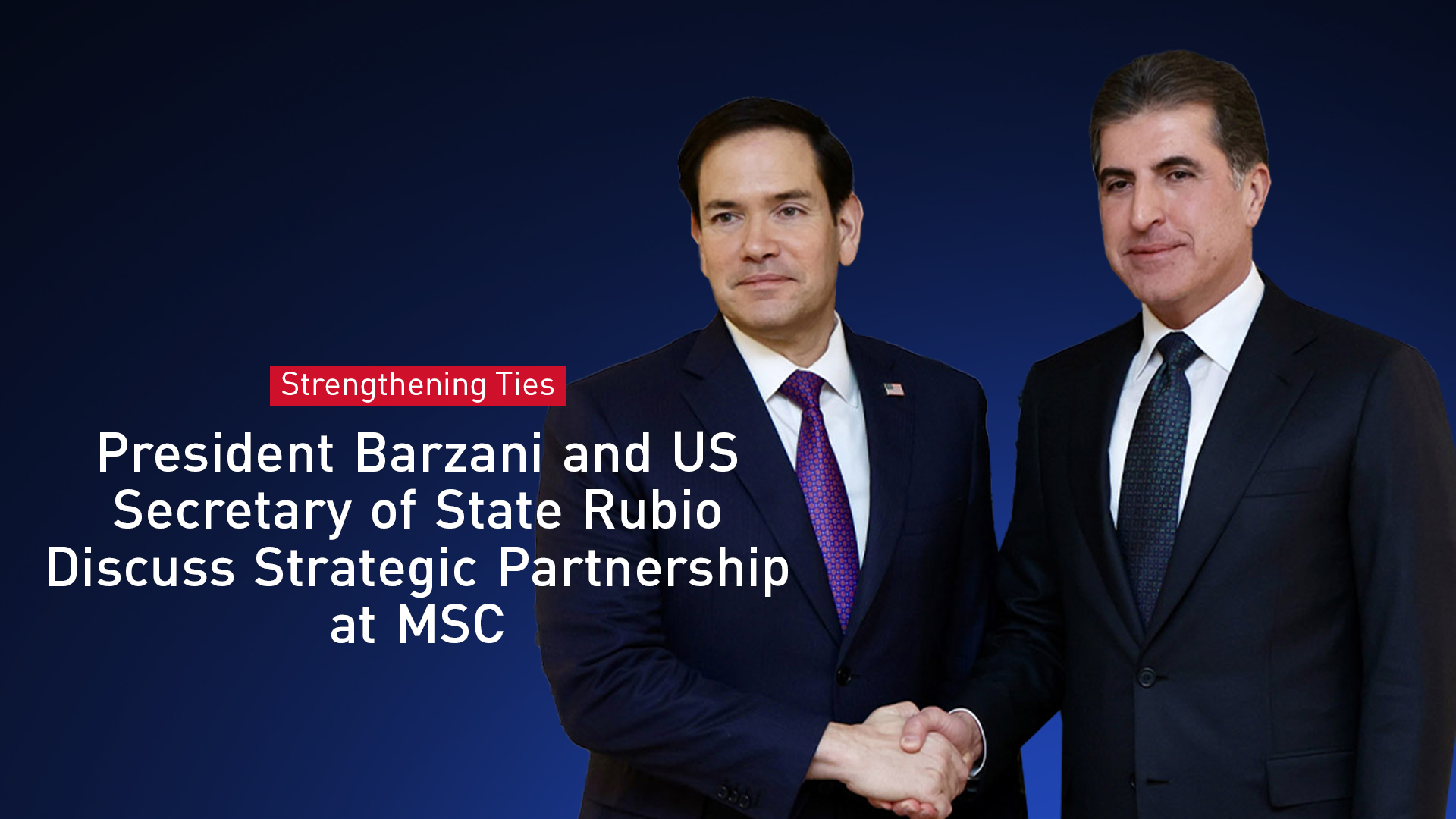President Nechirvan Barzani and US Secretary of State Rubio Discuss Strategic Partnership at MSC
President Nechirvan Barzani invited Rubio to attend the inauguration of the new US Consulate General in Erbil, an invitation that Rubio welcomed with enthusiasm.

ERBIL (Kurdistan24) - Kurdistan Region President Nechirvan Barzani met with United States Secretary of State Marco Rubio on the sidelines of the Munich Security Conference, on Saturday, reaffirming the strong partnership between the Kurdistan Region, Iraq, and the United States.
Their discussion centered on regional security, counterterrorism efforts, and the future of US-Kurdistan relations under the new U.S. administration.
President Barzani acknowledged the United States’ unwavering support in the fight against terrorism, particularly in combating ISIS in Iraq and Syria. He stressed the necessity of continued cooperation to maintain security and stability in the region.
In a symbolic gesture reflecting the deepening ties, Barzani invited Rubio to attend the inauguration of the new US Consulate General in Erbil, an invitation that Rubio welcomed with enthusiasm.
For his part, Secretary Rubio reiterated the United States’ commitment to its allies in Iraq and the Kurdistan Region, emphasizing the need for ongoing military and security collaboration. He also underscored the importance of economic development as a key pillar in ensuring long-term regional stability.
"U.S. Secretary of State Rubio and I reaffirmed the strong U.S.-Kurdistan Region of Iraq partnership. We discussed ways to further strengthen our cooperation and deepen our shared commitment to regional stability and security. I thanked the Secretary for his longstanding support," President Nechirvan Barzani posted on his personal X account, following the meeting.
U.S. Secretary of State @SecRubio and I reaffirmed the strong U.S.-Kurdistan Region of Iraq partnership. We discussed ways to further strengthen our cooperation and deepen our shared commitment to regional stability and security. I thanked the Secretary for his longstanding… pic.twitter.com/p6CgHso4ku
— Nechirvan Barzani (@IKRPresident) February 15, 2025
A Legacy of Strong US-Kurdistan Relations
The relationship between the United States and the Kurdistan Region has been defined by strategic cooperation, particularly in the fight against ISIS. Since 2014, Kurdish Peshmerga forces have played a critical role in defeating the terrorist group, receiving military and logistical support from Washington. The US has also provided humanitarian aid and supported economic initiatives in the region.
Political ties have remained robust, with past US administrations recognizing the Kurdistan Region as a key ally in Iraq. The construction of the US Consulate General in Erbil, the largest American diplomatic mission in the region, symbolizes this enduring partnership.
Marco Rubio: A Longtime Supporter of the Kurdish Cause
As a senator, Marco Rubio was an outspoken advocate for Kurdish rights, calling for stronger US engagement with the Kurdistan Region. He supported increased military aid to the Peshmerga and pushed for diplomatic recognition of the Kurds’ role in maintaining regional stability. His appointment as Secretary of State under President Trump signals a likely continuation of Washington’s commitment to the Kurdistan Region.
A Positive Outlook Under the Trump Administration
With Trump’s return to office, observers anticipate a reinforcement of US-Kurdistan relations. His administration is expected to prioritize counterterrorism efforts, economic investment, and security assistance in Iraq and the Kurdistan Region. Given Rubio’s historical support for the Kurds, his leadership at the State Department could further enhance cooperation, opening doors for expanded military and economic collaboration.
The Munich meeting between President Barzani and Secretary Rubio signals a promising chapter in US-Kurdistan relations, with both sides committed to strengthening their partnership in the face of regional challenges.